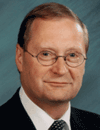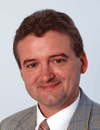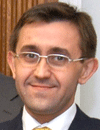Co-Located Conference AgendasChemical Biology | Flow Chemistry Europe | Formulation and Solubility | Fragment Based Lead Discovery | Targeting Protein-Protein Interactions | 

Tuesday, 19 March 201308:00 | Registration | |
Meso Flow Chemistry |
| | 09:15 |  | Keynote Presentation New Tools for Molecule Makers
Steven Ley, Professor, University of Cambridge, United Kingdom
This lecture will look at the challenges and difficulties presented to the synthetic chemist when preparing materials for commercial production and how the use of solid-supported reagents and other flow processing techniques can help. |
| 10:00 | Towards Lipase-Catalyzed Reactions under Continuous Flow Conditions
Rodrigo Souza, Associate Professor, Federal University of Rio de Janeiro, Brazil
Recent achievements on lipase catalyzed monoacylglycerol production, kinetic resolution of amines/alcohols and synthesis of sugar ester derivatives under continuous flow conditions will be presented. | 10:30 | Coffee Break and Networking in the Exhibition Hall | 11:15 | Economic and Practical Considerations of Switching from Batch to Continuous
Robert Ashe, Managing Director, AM Technology, United Kingdom
The commercial case for flow technology in chemical manufacturing is influenced by price competition and production costs. Success in switching from batch to continuous relies on identifying the right applications and employing the right hardware solutions. | 11:45 | Oxidations and Reductions with Iron-based Nanomaterials – a Continuous-Flow Approach
Toma Glasnov, Assistant Professor, Karl Franzens University Graz, Austria
This presentation will focus on liquid/liquid and gas/liquid/solid processes performed in continuous flow manner. Using nanoparticle catalysts based on iron oxides industrially relevant flow processes involving reductions with hydrazine as well as selective oxidations of benzyl alcohols will be demonstrated. The described processes are optimized in high-temperature/high-pressure regimes. | 12:15 |  Technology Spotlight: Technology Spotlight:
A Short Review of a Selection of Flow Chemistry Benefits Through Real Examples
Yann Lecouturier, Regional Manager, Syrris Ltd
Flow chemistry has a broad range of theoretical benefits making this technology very attractive. But , how does the theory do against real chemistry reactions? This presentation looks at a selection of these benefits through real examples done by users of flow systems.
| 12:30 | Lunch Break and Networking in Exhibition Hall | 13:30 | Poster Viewing Session | |
Lab to Pilot |
| | 14:15 |  | Keynote Presentation From Chemical to Process - Design Intensification in Flow - Novel Process Windows for Future Factories in Chemistry
Volker Hessel, Professor, Eindhoven University of Technology, Australia
Micro Process Technology facilitates heat and mass transfer (transport intensification). Novel Process Windows go beyond – the exploration of unusual harsh process conditions (chemical intensification) and, in a more holistic picture, a completely new and process design (process-design intensification). |
| 15:00 | Rate Based Process Design, Scale Up Across Equipment Types
Frans Muller, Professor, University Of Leeds, United Kingdom
This presentation will focus on generating and using laboratory data to develop rate expressions that can be used to evaluate different manufacturing options. | 15:30 | Coffee Break and Networking in the Exhibition Hall | 16:00 |  | Keynote Presentation Solids in Flow: Synthesis of Solids and Use of Solids
Tyler McQuade, Associate Professor, Florida State University, United States of America
Synthesis and use of solids in flow can be challenging. This talk will highlight strategies and benefits of using solids in flow. |
| 16:45 | End of Day One |
Wednesday, 20 March 2013 |
Microfluidic Flow Chemistry |
| | 09:00 |  | Keynote Presentation Microfluidic and Continuous Flow Reactors for Organic Synthesis
Paul Watts, Distinguished Professor and Research Chair, Nelson Mandela University, South Africa
Microfluidic and meso flow reactors will be compared to address how industry can scale reactions efficiently. |
| 09:45 | New Developments in Flow Chemistry
Floris Rutjes, Professor, Radboud University Nijmegen, Netherlands
The focus of this lecture will be on highly controlled gas/liquid processes in continuous flow labscale devices | 10:15 | Coffee Break and Networking in the Exhibition Hall | 11:00 | Supporting Tools for Development of Flow Chemistry Applications
Krist Gernaey, Associate Professor, Technical University of Denmark, Denmark
Process development is time-consuming. Tools from the process systems engineering (PSE) field which can support efficient development of continuous processes in micro- or meso-scale reactors will be highlighted. | 11:30 | Flow Process Design for Complex Pharma Related Syntheses
Alexei Lapkin, Professor, University of Warwick, United Kingdom
Formulation of design criteria on the basis of molecular understanding of chemical reactions is presented for the cases of stoichiometric reduction, C-C and C-N coupling and photochemical oxidation in the syntheses of APIs. | 12:00 | Lunch Break and Networking in Exhibition Hall | 13:30 | Poster Viewing Session | |
New Directions |
| | 14:00 | Flow Synthesis of Plasmonic Nanoparticles Using Micro Fluid Segments
J Michael Koehler, Head of Department, Technische Universitat Ilmenau, Germany
The technique of micro segmented flow was applied for synthesis of spherical, prismatic and disk-like metal nanoparticles. It allows an accurate control of size and shape. The high yield and high homogeneity is due to the fast and reproducible mixing of reactants under constant flow conditions. In addition, the technique allows the automated screening of particle properties by tuning of flow rate ratios. In result, large parameter fields can be checked and used for the addressing of plasmonic properties. | 14:30 | Intensifying the Production of Polymers by Microfluidic-assisted Continuous-flow Processes
Christophe Serra, Professor, University of Strasbourg, France
The presentation will give an overview of microfluidic-assisted flow-chemistry techniques for the intensified production of polymers with controlled compositions, architectures, molecular weights and molecular weight distributions. | 15:00 | Coffee Break and Networking in the Exhibition Hall | 15:30 | Examples of Continuous Flow Chemistry Using A Novel Non-Resonant Microwave Applicator
Mats Larhed, Group Leader, Uppsala University, Sweden
The design and technical features of a novel non-resonant microwave applicator will be presented, including examples of chemistry applications ranging from metal catalysis to synthesis of bioactive compounds. | 16:00 | Continuous Clean Alkene Epoxidation Process Technology for the Production of Commercially Important Epoxide Building Blocks
Basu Saha, Professor, London South Bank University , United Kingdom
This lecture will highlight cleaner and efficient catalytic epoxidation methods using an environmentally benign process. This new process provides many advantages to potential users: feedstock flexibility, atom efficiency, flexibility of scale of production, reduced unit costs and improved profitability. |
|


 Add to Calendar ▼2013-03-19 00:00:002013-03-20 00:00:00Europe/LondonFlow Chemistry Europe Flow Chemistry Europe in Munich, Germany Munich, Germany SELECTBIOenquiries@selectbiosciences.com
Add to Calendar ▼2013-03-19 00:00:002013-03-20 00:00:00Europe/LondonFlow Chemistry Europe Flow Chemistry Europe in Munich, Germany Munich, Germany SELECTBIOenquiries@selectbiosciences.com